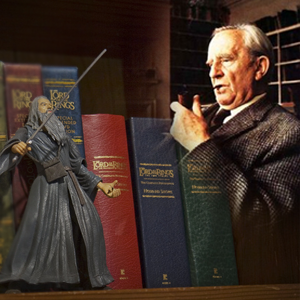Podcast: Play in new window | Download (Duration: 35:08 — 24.2MB) | Embed
Subscribe: Apple Podcasts | Spotify | Amazon Music | Android | Pandora | iHeartRadio | JioSaavn | Podchaser | Gaana | Podcast Index | Email | TuneIn | Deezer | Anghami | RSS | More
Episode 5 – Frodo’s Journey of Mercy and Transformation – A Lord of the Rings Spiritual Retreat w/Fr. Timothy Gallagher – Discerning Hearts Podcast

Father Gallagher and Kris McGregor discuss the spiritual journey of Frodo in “The Lord of the Rings,” particularly the latter part of his journey. He highlights Frodo’s growth and sanctification, as symbolized by Tolkien through Frodo’s changing appearance and inner light. This transformation reflects the spiritual development one undergoes through trials and tribulations.
The discussion moves on to Frodo’s challenges, his suffering, and his gradual transformation. Frodo’s journey is contrasted with Sam’s; while Sam returns to a normal life in the Shire, Frodo is forever changed by his experiences. This is emblematic of different life paths and vocations people undertake.
Father Gallagher then elaborates on Frodo’s inability to destroy the Ring, interpreting it not as a moral failure but a physical and mental exhaustion. He explains how Frodo’s earlier acts of mercy and pity, especially towards Gollum, play a crucial role in the destruction of the Ring and the salvation of Middle-Earth. This act of mercy is contrasted with traditional heroic acts, highlighting a Christian perspective of heroism through forgiveness and compassion.
In conclusion, Father Gallagher reflects on Frodo’s journey as a metaphor for the human experience. He stresses that our struggles, coupled with our capacity for mercy and forgiveness, can lead to fulfilling our life’s mission.
‘Are you in pain, Frodo?’ said Gandalf quietly as he rode by Frodo’s side. ‘Well, yes I am,’ said Frodo. ‘It is my shoulder. The wound aches, and the memory of darkness is heavy on me. It was a year ago today.’ ‘Alas! there are some wounds that cannot be wholly cured,’ said Gandalf. ‘I fear it may be so with mine,’ said Frodo. ‘There is no real going back. Though I may come to the Shire, it will not seem the same; for I shall not be the same. I am wounded with knife, sting, and tooth, and a long burden. Where shall I find rest?’ Gandalf did not answer.
Tolkien, J.R.R.. The Return of the King: Being the Third Part of the Lord of the Rings (Kindle Locations 4887-4892). Houghton Mifflin Harcourt. Kindle Edition..
But I have been too deeply hurt, Sam. I tried to save the Shire, and it has been saved, but not for me. It must often be so, Sam, when things are in danger: some one has to give them up, lose them, so that others may keep them.
Tolkien, J.R.R.. The Return of the King: Being the Third Part of the Lord of the Rings (Kindle Locations 5696-5697). Houghton Mifflin Harcourt. Kindle Edition.

Father Timothy M. Gallagher, O.M.V., was ordained in 1979 as a member of the Oblates of the Virgin Mary, a religious community dedicated to retreats and spiritual formation according to the Spiritual Exercises of St. Ignatius. Fr. Gallagher is featured on the EWTN series “Living the Discerning Life: The Spiritual Teachings of St. Ignatius of Loyola”.
For more information on how to obtain copies of Fr. Gallaghers’s various books and audio which are available for purchase, please visit his website: frtimothygallagher.org
For the other episodes in this series check out Fr. Timothy Gallagher’s “Discerning Hearts” page
Discerning Hearts reflection questions for this episode
Reflecting on the themes discussed in the podcast episode “Frodo’s Journey of Mercy and Transformation” with Fr. Timothy Gallagher, here are some study questions for reflection:
- Exploring Personal Transformation: How does Frodo’s journey in “The Lord of the Rings” reflect the transformations we undergo in our own spiritual lives? In what ways have you experienced personal growth through challenges and trials?
- The Power of Mercy and Pity: Father Gallagher highlights the importance of Frodo’s mercy towards Gollum. Reflect on a time when showing mercy or pity towards someone had a significant impact, either on your life or theirs.
- Understanding Failure and Weakness: Frodo’s inability to destroy the Ring is seen not as a moral failure but as a result of his exhaustion and the overwhelming power of the Ring. How does this perspective change your understanding of personal failures or weaknesses?
- The Role of Suffering in Spiritual Growth: Frodo’s journey is marked by suffering that leads to his spiritual growth. Can you identify moments in your life where suffering has contributed to your spiritual development?
- Contrasting Paths: Frodo and Sam: Frodo and Sam’s divergent paths after their journey illustrate different vocations and life choices. How do you relate this to the different paths people take in life, and how does it reflect the diversity of God’s callings?
- The Christian Concept of Heroism: Father Gallagher discusses a Christian sense of heroism rooted in forgiveness, mercy, and compassion, as opposed to traditional notions of heroism. How does this concept challenge or reinforce your understanding of what it means to be a hero?
- Applying Lessons from the Journey: What lessons from Frodo’s journey can be applied to contemporary challenges in your community or the world at large? How can these lessons inspire actions rooted in mercy and compassion?
- Reflection on Personal Sacrifices: Frodo sacrifices his own peace for the greater good. Reflect on a personal sacrifice you’ve made for others. How did this experience shape your understanding of love and service?
- Contemplating Spiritual Guides: Gandalf’s role in guiding Frodo and his friends can be seen as a metaphor for spiritual guidance. Who have been your Gandalfs in your spiritual journey, and how have they influenced your path?
- The Journey’s End and New Beginnings: Frodo’s journey ends with him finding peace in a different realm. How does this ending resonate with your understanding of life’s journey and the hope of eternal peace in the Christian faith?

 From the Holy Gospel According to St. Luke 1:26-38
From the Holy Gospel According to St. Luke 1:26-38




 From the Holy Gospel According to St. John 1:6-8,19-28
From the Holy Gospel According to St. John 1:6-8,19-28

